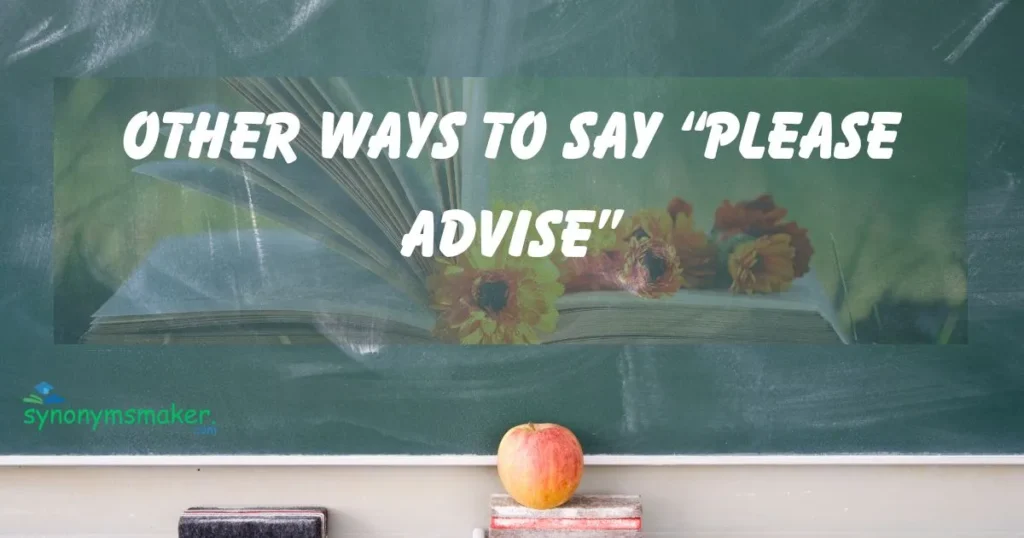While “Please Advise” is often used in emails, it can sometimes come across as formal, vague, or even demanding. Whether you’re messaging a manager, following up with a client, or requesting support from a coworker, using more specific and courteous alternatives creates a better tone and improves clarity.
Learn how to say “Please Advise” in more polished, respectful, and modern ways to improve your professional communication. In today’s fast-paced work environment, thoughtful phrasing builds trust and makes collaboration smoother. This guide will help you replace “Please Advise” with more engaging, direct, and respectful options—perfect for everything from project updates to policy clarifications.
Synonyms for “Please Advise”
- I Welcome Your Thoughts
- Your Opinion Matters
- Happy to Hear Your Take
- Do You Have Any Suggestions?
- Open to Your Recommendations
- Share Your Thoughts
- Your Guidance Needed
- I Would Appreciate Your Input
- Please Provide Your Insight
- Looking for Your Recommendations
- Requesting Your Expertise
- Would Love Your Feedback
- Seeking Your Advice
- Kindly Share Your Opinion
- What Are Your Suggestions?
I Welcome Your Thoughts
The phrase I welcome your thoughts is a graceful way to open a conversation, showing that you’re truly interested in what someone has to say. It expresses not just tolerance for opinions, but a genuine invitation for them.
It works beautifully in both formal and informal settings—whether you’re reviewing a project, discussing plans, or simply reflecting on an idea. It communicates respect and curiosity.
Welcoming someone’s thoughts builds trust and cooperation. It sends the message that you value input not just for show—but because it helps shape better understanding and outcomes.
This phrase also helps reduce defensiveness. Instead of framing the conversation as one-sided, it lets others feel like equal contributors, leading to more open discussions.
When you say “I welcome your thoughts,” you’re not closing the door with your opinion—you’re opening it to dialogue, insight, and mutual growth.
Your Opinion Matters
Saying your opinion matters is a powerful affirmation. It tells someone directly that their perspective is not only welcome but essential to the conversation or decision.
This phrase can have a huge impact in the workplace, at home, or in any relationship. It reminds people that they are seen, heard, and valued—not just filling space.
It can be especially useful in team settings, feedback sessions, or emotionally sensitive moments. When someone hears that their opinion matters, they’re more likely to share honestly and confidently.
It also builds a stronger sense of community and connection. People who feel their opinion matters tend to stay more engaged, helpful, and committed to outcomes.
Even in disagreement, this phrase creates balance. It says, “Even if we differ, your voice still deserves attention and care.”
Happy to Hear Your Take
The phrase happy to hear your take is light, approachable, and friendly. It adds a warm tone to your request, making people feel at ease and encouraged to share.
It’s perfect in creative work, team meetings, and informal exchanges. Instead of sounding like a demand, it gives off a vibe of openness and curiosity.
“Your take” feels modern and conversational. It suggests you’re looking for their unique view, not just a generic answer. That makes people more willing to participate.
This phrase is helpful when you want fresh perspectives or feedback. It lowers pressure and creates a space for authentic, even unexpected, contributions.
By saying “happy to hear your take,” you make it clear that feedback is welcome, not a burden. You’re genuinely interested in hearing what makes their view different or insightful.
Do You Have Any Suggestions?
Asking do you have any suggestions? invites someone to move from passive listener to active problem solver. It shows you’re open to collaborative thinking and shared solutions.
This phrase is especially effective in decision-making, planning, or resolving issues. It tells others that their ideas could influence the final outcome—which makes them feel empowered and respected.
It works well with colleagues, clients, or even in personal settings when trying to improve a situation. It reflects humility and willingness to improve based on new input.
This phrase also prevents one-way conversations. Instead of just explaining your view, you’re turning the discussion into a shared space for ideas.
By asking this question, you’re signaling that change or improvement is welcome—and that together, you can build something smarter, stronger, and more inclusive.
Open to Your Recommendations
Saying open to your recommendations combines humility with curiosity. It lets others know you’re not fixed in your thinking—you’re ready to receive helpful, experience-based ideas.
This phrase works well in work emails, customer requests, planning meetings, and personal goal-setting. It feels professional while still being warm and welcoming.
You’re not asking for criticism—you’re inviting solution-focused suggestions. It encourages the other person to offer something constructive and actionable.
It also shows self-awareness. You understand that someone else might have a better or different approach—and you’re wise enough to explore that input.
Saying you’re open to recommendations communicates collaboration and trust. It turns a one-sided moment into a meaningful conversation built on mutual respect and growth.
Share Your Thoughts
When you say share your thoughts, you’re creating an open space for someone to express what they genuinely feel or think. It’s an invitation that encourages honesty, creativity, and emotional input.
This phrase is perfect in both personal and professional settings. Whether you’re discussing a team plan or a personal decision, it tells the other person that their voice matters.
By asking someone to share their thoughts, you’re signaling that you’re not looking for commands or conclusions—you’re simply interested in their perspective and reflection.
This kind of phrasing promotes collaboration and mutual respect. It builds trust and makes the conversation more inclusive and emotionally safe.
Using this phrase shows you’re not trying to dominate a conversation—you’re seeking a richer experience by listening and learning from others.
Learn More: Other Ways to Say “Give You a Heads-Up”
Your Guidance Needed
Saying your guidance needed is a respectful and sincere way to ask someone to help you navigate a decision or situation. It acknowledges the value of their wisdom and experience.
It’s often used in work emails or mentorship relationships, where you’re seeking direction from someone you look up to. This phrase conveys humility and professionalism.
You might write, “Your guidance is needed to move forward on this issue,” which shows that you’re not just passing responsibility—you’re welcoming clarity and leadership.
This phrase works well in sensitive or unclear situations where you’re unsure about the next steps. It gives the other person space to offer advice with authority and reassurance.
Asking for guidance doesn’t make you look weak—it shows maturity. It means you trust others enough to help you grow, decide, or adjust wisely.
I Would Appreciate Your Input
When you say I would appreciate your input, you’re requesting someone’s opinion in a way that’s both polite and sincere. It reflects a willingness to listen and a genuine interest in the other person’s ideas.
This phrase is versatile—it fits formal meetings, team discussions, and even creative brainstorming sessions. It strikes the perfect balance between professional respect and human warmth.
Using this wording gives the other person a sense of ownership. Their input isn’t just helpful—it’s appreciated, invited, and valued.
It’s often used when decisions are collaborative or when more than one opinion could lead to a better result. It makes the process more inclusive and democratic.
Whether spoken or written, this phrase builds bridges. It turns ordinary requests into conversations that are mutually rewarding and mentally engaging.
Please Provide Your Insight
The phrase please provide your insight signals that you’re asking for more than just facts—you’re seeking depth, understanding, and personal perspective.
This is often used in business or academic contexts when deeper analysis or professional opinion is needed. It makes the conversation more thoughtful and purposeful.
Insight reflects experience and inner clarity. By using this phrase, you’re recognizing that the other person brings something unique and refined to the table.
It shows intellectual respect. You’re not just asking a casual question—you’re inviting someone to speak from a place of wisdom and interpretation.
When you say “please provide your insight,” it shows a high level of trust and seriousness. You’re not just solving a problem—you’re trying to do it with excellence and shared intelligence.
Looking for Your Recommendations
When you say looking for your recommendations, you’re requesting clear and practical advice based on someone’s experience, expertise, or preference.
This phrase works well when you need specific guidance—whether it’s choosing tools, strategies, or decisions. It’s often used in work emails or feedback forms where actionable suggestions are required.
You’re not asking them to decide for you—but to contribute something that helps you move forward wisely.
This request reflects openness to better ideas and respect for others’ opinions. It makes people feel included and acknowledged in the decision-making process.
By looking for someone’s recommendations, you’re showing that you value quality input and that you’re building a decision on a foundation of trusted voices.
Requesting Your Expertise
To say requesting your expertise is to formally and respectfully ask someone to apply their specialized knowledge to help with a task, challenge, or decision.
This phrase is excellent when you want to show high regard for someone’s experience. You’re not just asking for an opinion—you’re seeking a professional viewpoint.
Whether used in an email, meeting, or message, it shows that you trust their judgment. It emphasizes that their knowledge is needed and respected.
This phrase can also improve collaboration. When people feel their expertise is requested, they’re more likely to contribute with care and confidence, helping the entire group benefit from high-quality input.
Requesting expertise shows strength, not dependence—it demonstrates that great work happens when smart minds come together.
Would Love Your Feedback
Saying would love your feedback adds warmth and approachability to your request. It shows that you not only welcome input, but that it would truly mean something to you.
This phrase is friendly, casual, and great for use in emails, creative projects, and team collaboration. It softens the tone while still inviting meaningful conversation.
It’s often used when you’ve created something and want others to react—like a draft, design, or idea. You’re asking not for correction, but for insight, encouragement, and helpful critique.
It makes people feel valued, not just used. It shifts the dynamic from formal review to genuine contribution.
By using this phrase, you make space for others to engage honestly, helping you refine your ideas while strengthening mutual respect and connection.
Seeking Your Advice
To say seeking your advice is to openly admit you’re at a crossroads and trust someone enough to lean on their judgment. It’s a phrase that shows respect and emotional transparency.
It works especially well when you’re unsure and need someone to help you look at the situation with clarity, balance, or experience.
This request carries humility and confidence at once—you’re confident enough to ask and humble enough to listen. That makes it a phrase rooted in maturity and trust.
Whether you’re asking a mentor, friend, or colleague, seeking advice allows deeper dialogue. It opens the door to real connection and collaborative problem-solving.
In personal and professional spaces, seeking advice reminds others that their role in your life is valued, enduring, and impactful.
Kindly Share Your Opinion
When you say kindly share your opinion, you’re requesting input in a way that’s gentle, formal, and deeply respectful. It’s a courteous way to ask, without pressure or judgment.
This phrase is especially useful in written communication—feedback forms, discussions, or formal messages—where tone matters. It brings elegance and softness to your request.
You’re letting others know that what they think is worth expressing. And by saying it kindly, you make the interaction safer and more welcoming.
This creates a collaborative tone. Even in difficult discussions, kindness lowers defensiveness and encourages thoughtful responses.
When people feel safe to share, they offer better ideas. That’s why asking kindly for an opinion can lead to more genuine and valuable conversations.
What Are Your Suggestions?
Asking what are your suggestions? is a clear and open invitation for others to offer ideas, improvements, or creative input. It turns the conversation into a shared space.
This phrase is especially useful in meetings, planning sessions, or team environments where you want fresh perspectives. It says, “I’m not doing this alone—I want to hear from you.”
Suggestions are less formal than instructions or orders—they allow for flexibility, conversation, and exploration.
By asking this question, you show that you value innovation and collective intelligence. It tells others their ideas can help shape the outcome.
Whether spoken to one person or a group, this phrase empowers people to contribute in a way that’s helpful, collaborative, and solution-driven.
Learn More: Other Ways to Say “The Opposite of a Salutation” for Polite Endings
Real Life Examples and Scenarios
1. Scenario: Emailing a Supervisor About a Policy Question
You’re unsure about the next step in a new workflow and need your supervisor’s input.
Example:
“I’m unclear on the next phase of the process. Could you share your guidance when convenient?”
2. Scenario: Requesting Feedback on a Draft from a Client
You’ve sent a proposal and want to follow up in a polite, client-friendly tone.
Example:
“I’d love to ensure this meets your expectations—please let me know your thoughts when you have a moment.”
3. Scenario: Messaging a Teammate About a Deadline Decision
You need input from a teammate before moving forward with a shared task.
Example:
“We’re looking to finalize this by Friday. Can you confirm how you’d prefer to proceed?”
4. Scenario: Contacting HR for Confirmation on a Policy
You want to check if you’re interpreting a new leave policy correctly.
Example:
“I want to ensure I understand the policy correctly—could you clarify if this applies to part-time staff as well?”
5. Scenario: Checking in with a Vendor on Next Steps
You’re coordinating an event and need confirmation from a vendor about the delivery schedule.
Example:
“Before finalizing the event schedule, could you confirm delivery times so we can coordinate accordingly?”
Conclusion
While “Please Advise” is familiar, using more clear, kind, and modern alternatives can make your messages feel more professional, human, and actionable. Whether you say “let me know your thoughts,” “could you clarify,” or “how would you like to proceed?”—these expressions help you sound more collaborative and less transactional.
Great communication isn’t just about being direct; it’s about showing respect, consideration, and clarity in every exchange. So next time you’re tempted to type “Please Advise,” choose a phrase that truly reflects the tone and relationship you’re aiming to build.

Hi, I’m Adrian Steele, the admin of synonymsmaker.com. I’m passionate about language and dedicated to providing you with the best experience in discovering synonyms and expanding your vocabulary. Feel free to share your ideas or feedback with me. I’m always open to hearing from you!



